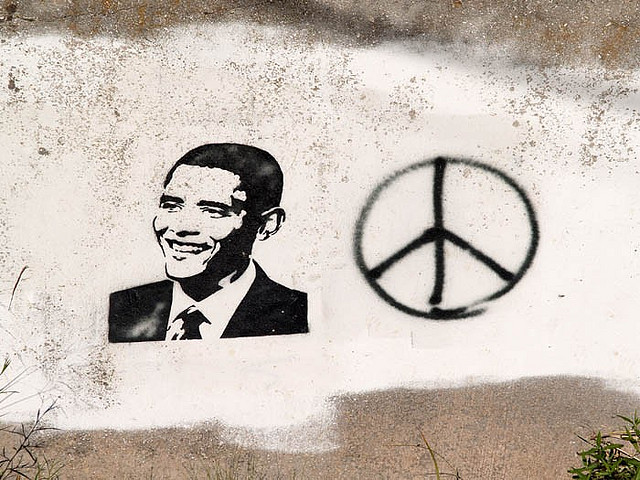After Barack Obama secured his second term Tuesday, there were a lot of questions about what it will look like. For those of us focused on the US government’s Mideast policy, the main question was whether Obama was going to exact revenge on Benjamin Netanyahu for his support of Mitt Romney. Bibi’s interference in American politics was unprecedented for any foreign leader. No amount of denial will change that.
I doubt Obama will punish Bibi, though it would not surprise me to see him signal to the Israeli electorate that he hasn’t forgotten Bibi’s loathsome behavior in advance of Israel’s January elections. And it’s very clear that Obama is going to have his hands full domestically as Republican leaders John Boehner, the Speaker of the House of Representatives, and Mitch McConnell, the Senate Minority Leader, have already made it clear that they will collapse the US economy (again) rather than let Obama and the Democrats act to fix it.
But it is also clear that the Middle East cannot be ignored for long, and that the Israel-Palestine conflict is at once still the key for US interests in the region but also much harder than ever before to resolve. Israeli leaders know this as well, as outspoken Likud leader Danny Danon said in reaction to Obama’s victory: “We will not capitulate before Obama.”
But Obama’s concerns go well beyond Israel and the Palestinians. The Arab world is extremely disappointed in his first-term performance, With good reason. The President abandoned his efforts at getting Israel to freeze its settlements, and allow Gaza some measure of freedom. An expanded war in Afghanistan largely negated any positive effect from Obama drawing down the American presence in Iraq. Drone attacks that kill civilians on a near-daily basis continue to sow a growing distrust of Obama’s goodwill. An unsatisfactory response to the Arab Spring revolts, that has ranged from tepid to outright oppositional, has similarly shown that the US remains uninterested in social change.
As the Arab world moves from autocracy towards democracy, the US can no longer afford to be seen as a cold imperial power that pursues its own interests at the expense of the so-called Arab street. America ought to be using the opportunity to reassert its liberal credentials, and foster regional democracy, much as it did in Eastern Europe, following the collapse of the Soviet bloc. Yes, there are strong regional differences, and they must be accounted for. However, the consequences would be similarly positive.
Obviously, there are steps Obama can take to effectively improve the United States’ standing in the Arab world and salvage some kind of positive relationship for the future. None of them will be easy, none of them will be meaningful if the US continues be perceived as an automatic backer of Israeli policies, no matter how draconian they might be. But these can also be problems with symbiotic solutions.
With eyes so focused on Iran, Syria and, as always, Israel, Obama will need to widen his view to encompass three more key countries: Egypt, Turkey and Bahrain. The last will be tricky, as that is where the US needs to use its influence on the existing autocrat to persuade him to move toward serious reform. The trouble there is that this will not sit well with the US’ key Gulf region ally, Saudi Arabia, which has been doing all it can to help keep the king, Hamad bin Isa Al Khalifa, entrenched in power without such reforms.
The Saudis, naturally, fear that successful reform movements in other Gulf monarchies will spark similar demonstrations in their own country, something they’ve been able to avoid so far. Bahrain is also the headquarters of the US Navy’s Fifth Fleet, from where it directs operations in the Persian Gulf, Red Sea, and Arabian Sea. Especially with the tensions with Iran, this is not a home port the US wishes to risk.
In 2011, the Obama Administration delayed arms sales to Bahrain but eventually resumed them this year. A threat to cut off all military support for Bahrain might be too risky. However, a much more aggressive and public program of pressure on the kingdom to heed calls for reform, matched with some smaller sticks than a total cutoff of aid would, at the very least, demonstrate some sort of US support for democracy movements in the Arab world. While many Americans believe our government has been supportive of the Arab Spring, the Arab world remembers that we consistently stayed back, only backing protesters in Tunisia and Egypt when it became clear that the dictators we had supported for so long were not going to prevail.
Many Americans also see the presence of avowedly Muslim parties emerging as the new Arab leaders as a failure of Arab democracy. But of course this stems from the belief that “we” know how to do democracy and “they” don’t. Western democracy has the separation of church and state (to varying degrees, depending on the country) as a core principle. That is not due to a necessary characteristic of democracy, but rather to how it has evolved in the West.

Occidental democracy evolved through that separation, replacing the notion of the divine right of kings, or even, in some places, more direct religious rule. We cannot expect a similar secularization of politics in Islamic states, as oftentimes, democratic principles are reconciled with religious values, however unsatisfying that may appear to neoconservatives, for whom Arab secularism is an oxymoron. What transpired in Iran is local to Iran. Its lack of democracy is not necessarily a ‘Muslim’ problem, as an Iranian one. And Iran is not an Arab state.
In the Arab world, this evolution is still taking place, really just starting, and the conditions are different. The setting is post-colonial, and this is no minor factor. There is also the fact that the dominant religion in the region, Islam, is set up to govern in a way that Judaism (with its inherent mistrust in kings, as Samuel the Prophet so clearly expressed) and Christianity (“”Render unto Caesar the things which are Caesar’s, and unto God the things that are God’s”) were not. Perhaps most importantly, though, the Arab experience of secular ideology has been decidedly authoritarian and brutal. The turn to religious leadership to offer an alternative, which was frequently facilitated by the United States and its allies, is sensible under those circumstances, represents a very different experience than anything that has happened on a national scale in the west and is not inherently anti-democratic by definition.
How this dynamic plays out remains to be seen. What we can be certain of is that America’s standing in the Arab world is, at best, only slightly better than at the end of the Bush Administration and that standing is going to matter more in the coming years. That is where Egypt and Turkey come in for US foreign policy.
These two countries are still US allies, but the relations are considerably more strained than in the past. They also appear to be the models for the new Middle East: democratic structures, which for obvious reasons are far more developed in Turkey than in Egypt, but with full openness to religious parties. Turkey in particular has melded liberal, secular, conservative and religious parties into a government that is more responsive to its populace than in the past, although Turkey’s Kurdish population continues to face serious repression, albeit not as bad as in the 1990s.
In great measure, the tensions between Egypt and Turkey, in one hand, and the US on the other come back to Israel. That’s not the only reason—many in the US, and certainly far too many members of Congress have an immediate and harsh reaction to a “Muslim government” of any kind, even if they suspend this reaction when it comes to rich allies like Saudi Arabia. And there are also some real differences that need to be dealt with.
But the more responsive governments that now exist in both Turkey and Egypt are compelled to take a stronger stance in defense of the Palestinians. It’s particularly important because the Palestinian issue is one of a very few that unite people in both countries across ideological and religious lines. But the Israeli government is facing very little domestic pressure to reach an accommodation with the Palestinians and Israel’s alleged “supporters” in the US and elsewhere undermine Israelis’ future by blocking even the mildest pressure on Israel to act to free the Palestinians from occupation and siege, let alone the sort of serious pressure it would take to move even a moderate Israeli government, which the current one certainly is not.
If Obama moves to ease tensions with Egypt and Turkey and even minimally moves to extend some support to the pro-democracy movement in Bahrain, this would certainly perk some interest in the Arab and larger Muslim world. While it would not be nearly enough to reverse the tide of negativity toward the US that has been rising, it would have another important effect: it would raise a near panic in Jerusalem and some serious concerns even on the comparatively liberal streets of Tel Aviv and Haifa as well.
That fear could spur a real push in Israel for an agreement with the Palestinians. From there, a few things would need to happen, including Hamas and Fatah finding a way to create a unified Palestinian body politic, and a concerted effort by the Obama Administration, which would surely be supported by Europe and the Arab League, to push for a deal that would be acceptable to both the Israeli and Palestinian publics. Such an arrangement would trump even the obstructionism of their respective leaderships.
That’s a tall order, but none of it is undoable. It would also require a toning down of the Iran tensions. With Iranian President Mahmoud Ahmadinejad nearing the end of his tenure, and with both sides starting to send signals about serious negotiations, that too is not impossible.
All this can be done if Barack Obama decides to spend his political capital on enhancing the future of the United States’ role in the Middle East in a positive way. A recent report put together by a number of former diplomats and long-time scholars of US Middle East policy strongly suggests that the United States abandon the line that “The US cannot want peace more than the Israelis and Palestinians.”
It can, and, in fact, it does, at least more than Israel, which has become comfortable in a low-cost colonial occupation, the ending of which seems to carry all the political and security risks it has found a way to manage under the status quo.
The Obama we saw in his first term would never take such bold steps. Will the second term version be any different? It seems unlikely. Nonetheless, the best interests of the US, Israel and the Palestinians lie in this direction. Israel’s radical right, and its supporters in AIPAC, and their followers and among the Christians led by CUFI and similar groups stand in the way, but they have Congress on their side. The same old calculus will remain at play. However, there’s a greater urgency now, because if Obama fails to act, no US President who follows him will have nearly as much influence over the future direction of the Middle East.
Photographs courtesy of Futurowoman and meeshypants. Published under a Creative Commons license.





